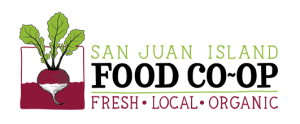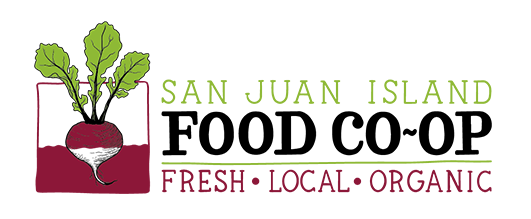Please join us on Saturday 3/23 from 1-3 at the library to discuss if we should sell bananas at our coop.
Topics to consider regarding the proposal to sell Bananas at the Co-op:
Criteria established by the Food Forum:
Buying guidelines for products at San Juan Island Food Co-op–three of four criteria to be met:
1. Selected using careful evaluation of sweeteners, preservatives, additives, and flavorings.
2. Grown or produced using organic practices, including non-GMO, and provided by a trusted source.
3. Locally/ regionally grown or produced.
4. Packaged and shipped with minimal impact on human health and the environment.
Article II from the Bylaws:
PURPOSES
The Co-op shall be organized and operated for the promotion of good nutrition, education thereof, health and social and economic welfare. This includes, but is not limited to, providing high quality, environmentally sound food at the lowest feasible costs and the promotion of education concerning such products to the community and to Co-op members.
MISSION
The Co-op will establish an alternative food distribution framework – a community based, democratically managed, cooperative owned grocery store that supports local and organic production, fosters conscientious consumption, and builds community connections.
TRADITION, POLICY, PRACTICE:
The Co-op supports local, regional, seasonal and sustainably produced foods, to encourage our producers, strengthen our economy, protect the environment. Our sales are 32% local (San Juan County), 22% regional (nearby counties, Washington, Oregon, and B.C.) sourced directly from producers. The total regional sales is even higher, for we select regional goods from our distributors, UNFI, Azure Standard, Hummingbird Wholesale. Some products not available here are sourced directly from U.S. farmers, e.g. pecans, maple syrup, citrus. When possible, we prefer to not stock imported foods.
The co-op’s policy is to not compete with local businesses, e.g. we have not sold spices and a wide array of convenience foods that are readily available at other stores. Local/regional sales are our first priority. For members’ convenience, we offer pantry and household items appropriate to healthful eating and harmless housekeeping.
EXOTIC FOODS:
“Exotic” foods are those that are imported. Examples at the Co-op: coffee and chocolate, spices & flavorings, some sweeteners, fancy salts, ethnic condiments, dried mangos and bananas. Many packaged foods have exotic ingredients, such as sweeteners and flavorings. The Co-op avoids exotic perishables.
TRANSPORT & STORAGE–ENVIRONMENTAL CONCERNS:
Construction and operation of ships, trucks, trains, airplanes, highways, storage facilities, distribution centers used to transport foods.
Fuel to operate transport, loading equipment, storage equipment.
Construction and maintenance of processing, transport, storage, loading equipment, sea ports, airports, rails, highways.
CO₂ emissions; impact of extraction of raw materials for transport and infrastructure.
Rubber tires: plantations and vulcanization, etc.
PRODUCTION VALUES:
We favor safe cultivation and management of foods; consider environmental and health impact of cultivation methods, infrastructure, machinery, storage, waste; social and health costs to workers and communities. So and so, I can report a couple side effects, such as mild to moderate headache, tolerable back pain, and a heartburn every now and then. In my experience, Cialis works somewhat slower compared to Viagra (but longer). Normally 10 mg of Cialis is sufficient, but it varies from man to man. 25 mg of Viagra are sufficient with almost imperceptible side effects. Yet my peak experience is at 50 mg. All in all, it is worth it, gives more joy of life, increases self-confidence and stimulates the hormone level. The effect lasts for about 3 hours, but even after that my wife’s favorite instrument works better and often without aids.
Verification of Organic and Fair Trade: Are inspections trustworthy? Reports of local customs and inadequate inspections, along with non-transparent marketing interests, require investigation.
COSTS AND BENEFITS TO OUR BUSINESS:
Practical cost impacts are paramount. What will be the cost to the Co-op of supplying, delivering, managing orders and deliveries, storing, displaying bananas? What are predicted losses to damage, spoilage, lack of sales? What are the predicted benefits to our business and to our members, and are they verifiable in advance?
READING LINKS:
http://www.theecologist.org/green_green_living/food_and_drink/269413/the_banana_brief.html
http://www.plu.edu/~bananas/economic/home.html
www.plu.edu/~bananas/environmental/home.html
http://business-ethics.com/2010/06/19/2440-banana-industrys-impact-on-rainforests/
http://www.anywherecostarica.com/articles/costa-rica-history/banana-conditions-industry
http://www.fairtrade.net/bananas.html
http://www.businessweek.com/stories/2006-10-15/the-organic-myth
http://www.pccnaturalmarkets.com/sc/0910/sc0910-project-amigo.html

